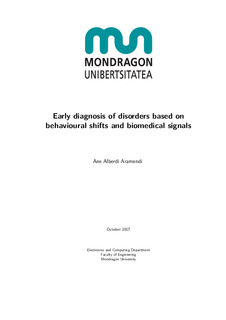
Ikusi/
Izenburua
Early diagnosis of disorders based on behavioural shifts and biomedical signalsEgilea
Irakurtze Data
2017-12-14Argitalpen data
2017Dokumentu-mota
Doktore tesiaDoktore tesiaHizkuntza
IngelesaEskubideak
© 2017 Ane Alberdi AramendiSarbidea
Sarbide irekiaArgitaratzailearen bertsioa
https://doi.org/10.48764/v2rx-6e84Argitaratzailea
Mondragon Unibertsitatea. Goi Eskola PoliteknikoaGako-hitzak
Análisis de datos
Teoría y procesos de decisión
Inteligencia artificial
Bioestádistica ... [+]
Teoría y procesos de decisión
Inteligencia artificial
Bioestádistica ... [+]
Análisis de datos
Teoría y procesos de decisión
Inteligencia artificial
Bioestádistica
ODS 3 Salud y bienestar
ODS 11 Ciudades y comunidades sostenibles [-]
Teoría y procesos de decisión
Inteligencia artificial
Bioestádistica
ODS 3 Salud y bienestar
ODS 11 Ciudades y comunidades sostenibles [-]
Laburpena
There are many disorders that directly affect people’s behaviour. The people that are suffering from such a disorder are not aware of their situation, and too often the disorders are identified by rel ... [+]
There are many disorders that directly affect people’s behaviour. The people that are suffering from such a disorder are not aware of their situation, and too often the disorders are identified by relatives or co-workers because they notice behavioural shifts. However, when these changes become noticeable, it is often too late and irreversible damages have already been produced. Early detection is the key to prevent severe health-related damages and healthcare costs, as well as to improve people’s quality of life.
Nowadays, in full swing of ubiquitous computing paradigm, users’ behaviour patterns can be unobtrusively monitored by means of interactions with many electronic devices. The application of this technology for the problem at hand would lead to the development of systems that are able to monitor disorders’ onset and progress in an ubiquitous and unobtrusive way, thus enabling their early detection. Some attempts for the detection of specific disorders based on these technologies have been proposed, but a global methodology that could be useful for the early detection of a wide range of disorders is still missing.
This thesis aims to fill that gap by presenting as main contribution a global screening methodology for the early detection of disorders based on unobtrusive monitoring of physiological and behavioural data. The proposed methodology is the result of a cross-case analysis between two individual validation scenarios: stress in the workplace and Alzheimer’s Disease (AD) at home, from which conclusions that contribute to each of the two research fields have been drawn. The analysis of similarities and
differences between the two case studies has led to a complete and generalized definition of the steps to be taken for the detection of a new disorder based on ubiquitous computing. [-]
Jendearen portaeran eragin zuzena duten gaixotasun ugari daude. Hala ere, askotan, gaixotasuna pairatzen duten pertsonak ez dira euren egoerataz ohartzen, eta familiarteko edo lankideek identifikatu o ... [+]
Jendearen portaeran eragin zuzena duten gaixotasun ugari daude. Hala ere, askotan, gaixotasuna pairatzen duten pertsonak ez dira euren egoerataz ohartzen, eta familiarteko edo lankideek identifikatu ohi dute berau jokabide aldaketetaz ohartzean. Portaera aldaketa hauek nabarmentzean, ordea, beranduegi izan ohi da eta atzerazeinak diren kalteak eraginda egon ohi dira. Osasun kalte larriak eta gehiegizko kostuak ekiditeko eta gaixoen bizi kalitatea hobetzeko gakoa, gaixotasuna garaiz detektatzea da.
Gaur egun, etengabe zabaltzen ari den Nonahiko Konputazioaren paradigmari esker, erabiltzaileen portaera ereduak era diskretu batean monitorizatu daitezke, gailu teknologikoekin izandako interakzioari esker. Eskuartean dugun arazoari konponbidea emateko teknologi hau erabiltzeak gaixotasunen sorrera eta aurrerapena nonahi eta era diskretu batean monitorizatzeko gai diren sistemak
garatzea ekarriko luke, hauek garaiz hautematea ahalbidetuz. Gaixotasun konkretu batzuentzat soluzioak proposatu izan dira teknologi honetan oinarrituz, baina metodologia orokor bat, gaixotasun sorta zabal baten detekzio goiztiarrerako erabilgarria izango dena, oraindik ez da aurkeztu.
Tesi honek hutsune hori betetzea du helburu, mota honetako gaixotasunak garaiz hautemateko, era diskretu batean atzitutako datu fisiologiko eta konportamentalen erabileran oinarritzen den behaketa sistema orokor bat proposatuz. Proposatutako metodologia bi balidazio egoera desberdinen arteko analisi gurutzatu baten emaitza da: estresa lantokian eta Alzheimerra etxean, balidazio egoera
bakoitzari dagozkion ekarpenak ere ondorioztatu ahal izan direlarik. Bi kasuen arteko antzekotasun eta desberdintasunen analisiak, gaixotasun berri bat nonahiko konputazioan oinarrituta detektatzeko jarraitu beharreko pausoak bere osotasunean eta era orokor batean definitzea ahalbidetu du. [-]
Bildumak
- Tesiak - Ingeniaritza [243]
Item honek honako baimen-fitxategi hauek dauzka asoziatuta:





















